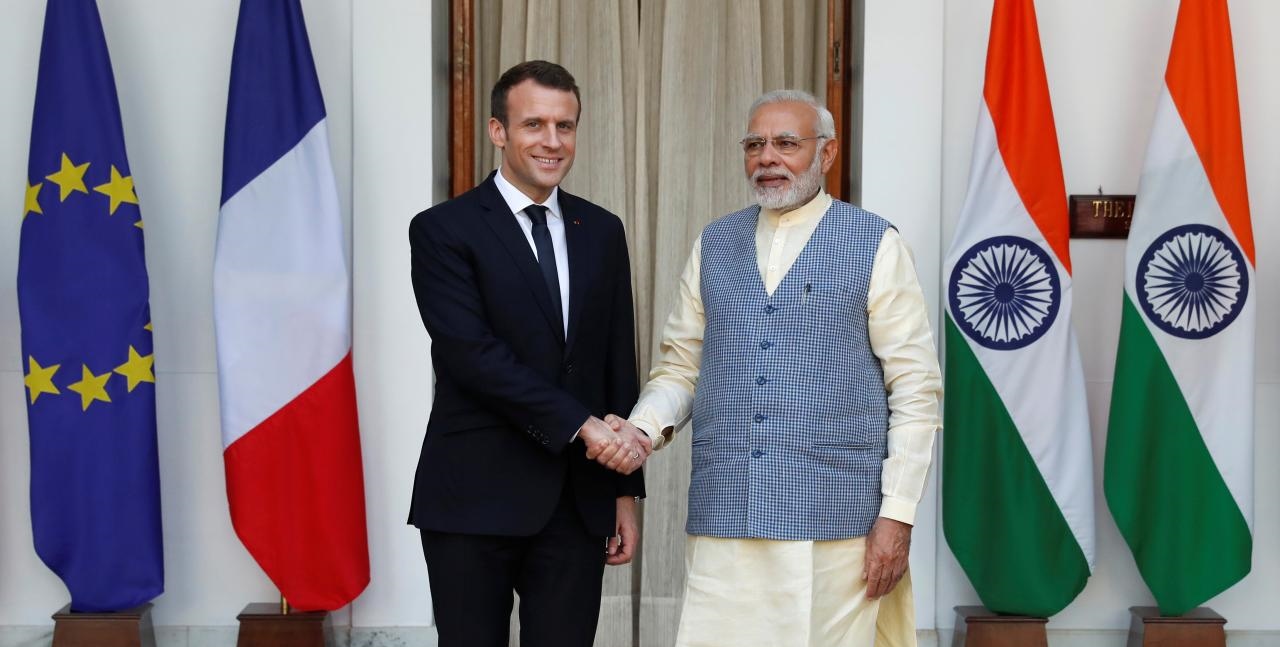France-India deepen ties
March 12, 2018 | Expert Insights

French President Emmanuel Macron has promised to invest 700 million euros in the International Solar Alliance, amidst talks of deepening ties with India. The International Solar Alliance is an inter-governmental organisation for clean energy. It was launched by Indian Prime Minister Narendra Modi in 2015.
Background
The International Solar Alliance (ISA) is a treaty-based inter-governmental organisation intended to foster the development of clean energy technology. The alliance was first proposed by Indian Prime Minister Narendra Modi at the India Africa Summit in November 2015, prior to the Paris COP21 summit. Today, it includes 121 member nations across the world, of which 56 have signed the framework agreement. At the 2015 summit, India pledged that it would install 175GW of renewable energy by 2022, and obtain 40% of its electricity from renewable sources by 2030.
The agency was founded in order to collaborate “joint efforts… to reduce the cost of finance and the cost of technology, mobilize more than US $1 trillion of investments needed by 2030 for massive deployment of solar energy,” according to an official statement. The organization identifies the potential of “solar resource rich countries” that lie in the torrid zone between the Tropics of Cancer and Capricorn.
The alliance also aims to “lower costs, increase quality, and bring reliable and affordable solar energy” to a number of developing countries. It raises funds to develop accessible, solar-based technology.
France has supported the ISA since its conception in 2015. At the time, President Hollande described the alliance as “an avant garde of countries that believe in renewable energies” that “gives meaning to sharing technology and mobilising financial resources in an example of what we wish to do in the course of the climate conference.”
India and France have a strategic partnership and bilateral cooperation in a number of areas, particularly defence, civil nuclear energy, and space. France has consistently supported India’s permanent membership of the United Nations Security Council. The two countries have also worked together on the Comprehensive Convention on International Terrorism (CCIT). In recent years there have been a number of high-level state visits. Total trade between the two nations increased from approximately € 5,000 million to € 8,500 million from 2006-2016.
Analysis
French President Emmanuel Macron’s most recent state visit to India marks 20 years of strategic partnership. Since the French President’s arrival on Friday, the two countries have signed 14 MoUs worth $16 billion. These MoUs covered more traditional topics including civil nuclear power, space research, and defence, as well as maritime security and counter terrorism. Other areas covered included railways, urban development, and renewable energy.
“Whether it’s the environment, naval security and resources, or freedom of navigation and overflight, we are committed to making our partnership stronger on all these fronts,” Prime Minister Modi said in a press statement on Saturday. “The autonomous and independent foreign policies of both our countries are focused not only on their own interests or on the interests of our countrymen, but they are also centred on safeguarding universal human values. We consider France one of our most reliable defence allies.”
At the International Solar Alliance (ISA) founding conference in New Delhi on March 11th, President Macron announced that France will invest €700 million in the alliance. France had invested €300 million when the ISA was first established.
“We need to remove all obstacles and scale up [solar energy production]” Macron said at the launch. Macron praised the “Solar Mamas”, an all women group of solar engineers, and commended Indian efforts. “Some countries decided just to leave the floor and leave the Paris Agreement,” he added, in what some have interpreted as a jibe towards US President Trump.
A “Delhi Solar Agenda” declared at the end of the conference stated, “our endeavour has the potential to achieve sustainability by generating growth, enhancing skills, creating jobs, unleashing entrepreneurship, fostering innovation and increasing incomes.” India announced that it would offer $1.4 billion in credit for ISA projects.
The event was attended by a number of other leaders, including high ranking officials from the Asian Development Bank and African Development Bank. On Monday, the two heads of state inaugurated Uttar Pradesh’s largest solar power plant, which was manufactured by the French firm ENGIE. India’s Vikram Solar also reportedly signed an agreement with French Alternate Energies and Atomic Energy Commission.
Assessment
Our assessment is that due to climate change, it is becoming increasingly essential to develop alternate sources of energy. The ISA will help a number of countries reduce their dependence on fossil fuels. Additionally, President Trump’s stance on climate change and the Paris agreement has provided space for other countries to step up. We believe that renewable energy provides a new front for Indo-French cooperation. It would be beneficial for India to further deepen ties with Paris.








Comments